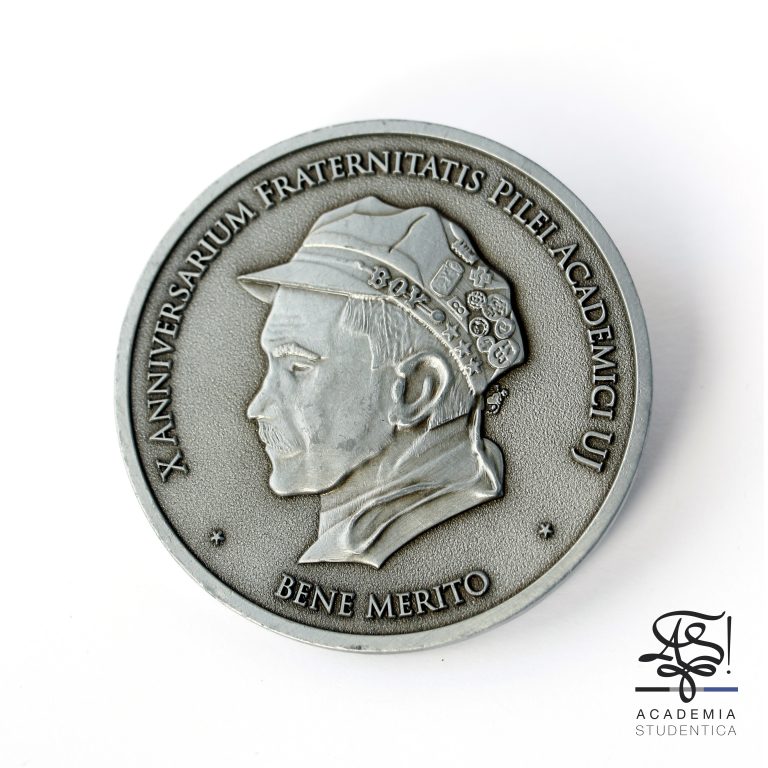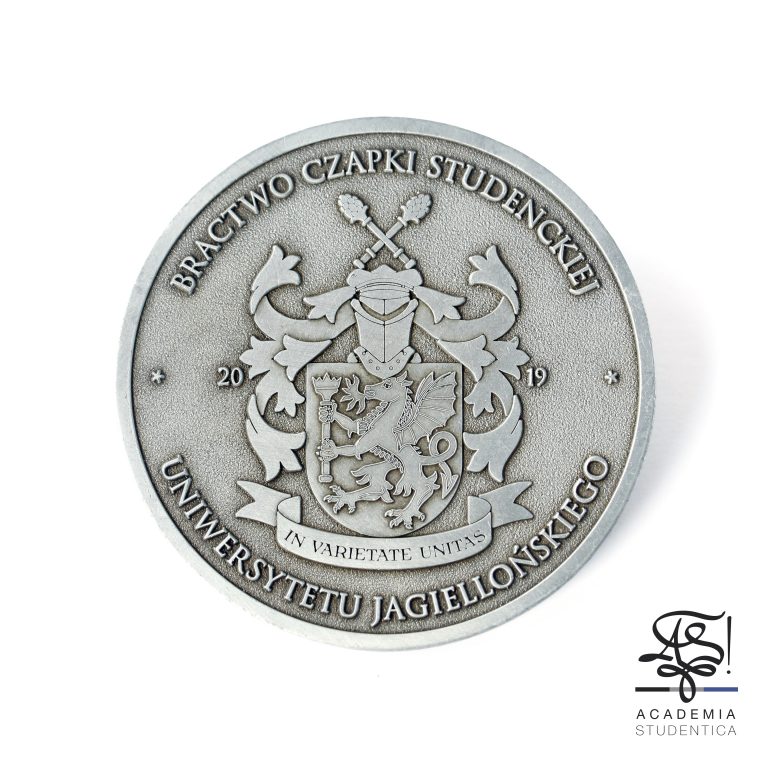Pewter medal depicting Tadeusz Boy-Żeleński , designed by Natalia Ciesielska v/o Szynka, commissioned by Kasper Krawet v/o Pumba in honor of the 10th anniversary of Bractwo Czapki Studenckiej UJ, Jagiellonian Univeristy, Poland, Kraków, 2019.
Coll.: Pumba & Cap’n
On 6 April 2019, Bractwo Czapki Studenckiej Uniwersytetu Jagiellońskiego (BCSUJ) celebrated their 10th anniversary with this medal of which only 50 exist. The medals are awarded to people who the BCSUJ considers to have contributed significantly to their development as well as the propagation of Polish studentical culture and folklore. A limited number were donated to specialized collections and museums in order to immortalize the student association, which in 2009 noone gave a chance to survive beyond the first semester.
BCSUJ is the first official egalitarian, apolitical and areligious student organization identifying with the tradition of the Polish student cap. By cultivating and developing student traditions, especially those associated with Krakow, BCSUJ also draws on the European Goliard movement.
Tadeusz Boy-Żeleński was born on 21 December 1874 in Warsaw. Because higher education in Polish was forbidden in Warsaw under Russian rule, Żeleński left for Kraków in 1892, in Austrian-ruled Galicia, where he enrolled at the Jagiellonian University medical school and got his medical degree in 1901.
Not much is known about Tadeusz’ student life, though biographers have found proof that he was closely associated to Stanisław Przybyszewski and even more so with his wife, Dagny.
As a student he wasn’t shy to drink and one of his favorite pastimes was gambling.
During his entire life he was a true Francophile and translated most of the classical works. In his activities and works he expressed the ideals of humanism, common sense, good wit and a light pen.
He probably never wore a Czapka, because these only gained popularity in the 1920’s, but as a graduate of the Jagiellonian university, a writer, critic, an outstanding and eminently non-cristalline figure, chief clown of the Second Republic of Poland and one of the favorite authors of the founders of the BCSUJ, they found it more than fitting to commemorate him.
Médaille en étain représentant Tadeusz Boy-Żeleński , conçue par Natalia Ciesielska v/o Szynka, commandée par Kasper Krawet v/o Pumba en l’honneur du 10e anniversaire de Bractwo Czapki Studenckiej UJ, Université Jagellon de Cracovie, Pologne, Cracovie, 2019.
Coll. : Pumba & Cap’n
Le 6 avril 2019, Bractwo Czapki Studenckiej Uniwersytetu Jagiellońskiego (BCSUJ) a célébré son 10e anniversaire avec cette médaille dont il n’existe que 50 exemplaires. Les médailles sont décernées aux personnes qui, selon le BCSUJ, ont contribué de manière significative à leur développement ainsi qu’à la propagation de la culture et du folklore polonais. Un nombre limité a été donné aux collections et musées spécialisés afin d’immortaliser l’association des étudiants, dont personne n’a donné en 2009 la chance de survivre au-delà du premier semestre.
BCSUJ est la première organisation étudiante officielle égalitaire, apolitique et aréligieuse qui s’identifie à la tradition du chapeau d’étudiant polonais. En cultivant et en développant les traditions étudiantes, notamment celles associées à Cracovie, la BCSUJ s’inspire également du mouvement goliard européen.
Tadeusz Boy-Żeleński est né le 21 décembre 1874 à Varsovie. L’enseignement supérieur en polonais étant interdit à Varsovie sous la domination russe, Żeleński part pour Cracovie en 1892, en Galice sous domination autrichienne, où il s’inscrit à la faculté de médecine de l’université Jagellon et obtient son diplôme de médecine en 1901.
On sait peu de choses sur la vie étudiante de Tadeusz, bien que les biographes aient trouvé des preuves qu’il était étroitement associé à Stanisław Przybyszewski et encore plus à sa femme, Dagny.
En tant qu’étudiant, il n’avait pas peur de boire et l’un de ses passe-temps favoris était le jeu.
Durant toute sa vie, il a été un véritable francophile et a traduit la plupart des œuvres classiques. Dans ses activités et ses œuvres, il exprimait les idéaux de l’humanisme, du bon sens, de la bonne humeur et de la plume légère.
Il n’a probablement jamais porté de Czapka, car ces derniers n’ont gagné en popularité que dans les années 1920, mais en tant que diplômé de l’université jagellonne, écrivain, critique, personnalité exceptionnelle et éminemment non-cristalline, clown en chef de la deuxième République de Pologne et l’un des auteurs préférés des fondateurs de la BCSUJ, ils ont trouvé plus qu’approprié de lui rendre hommage.
Tinnen medaille met Tadeusz Boy-Żeleński , ontworpen door Natalia Ciesielska v/o Szynka, in opdracht van Kasper Krawet v/o Pumba ter ere van de 10e verjaardag van Bractwo Czapki Studenckiej UJ, Jagiellonische Univeristeit, Polen, Krakau, 2019.
Coll.: Pumba & Cap’n
Op 6 april 2019 vierde Bractwo Czapki Studenckiej Uniwersytetu Jagiellońskiego (BCSUJ) zijn 10e verjaardag met deze medaille waarvan er slechts 50 bestaan. De medailles worden uitgereikt aan mensen die volgens de BCSUJ een belangrijke bijdrage hebben geleverd aan hun ontwikkeling en aan de verspreiding van de Poolse studentencultuur en -folklore. Een beperkt aantal werd geschonken aan gespecialiseerde collecties en musea om de studentenvereniging te vereeuwigen, die in 2009 volgens niemand de kans had om na het eerste semester te overleven.
BCSUJ is de eerste officiële egalitaire, apolitieke en areligieuze studentenorganisatie die zich identificeert met de traditie van de Poolse studentpet. Door het cultiveren en ontwikkelen van studententradities, met name die welke geassocieerd worden met Krakau, put BCSUJ ook uit de Europese Goliard-beweging.
Tadeusz Boy-Żeleński werd geboren op 21 december 1874 in Warschau. Omdat het hoger onderwijs in het Pools onder Russisch bestuur in Warschau verboden was, vertrok Żeleński in 1892 naar Krakau, in het door Oostenrijk bestuurde Galicië, waar hij zich inschreef aan de medische school van de Jagiellonische Universiteit en in 1901 zijn medische graad behaalde.
Er is niet veel bekend over het studentenleven van Tadeusz, hoewel biografen bewijzen hebben gevonden dat hij nauw verbonden was met Stanisław Przybyszewski en nog meer met diens vrouw, Dagny.
Als student was hij niet bang om te drinken en een van zijn favoriete bezigheden was gokken.
Gedurende zijn hele leven was hij een ware francofiel en vertaalde hij de meeste klassieke werken. In zijn activiteiten en werken verwoordde hij de idealen van het humanisme, gezond verstand, goed verstand en een lichte pen.
Hij droeg waarschijnlijk nooit een Czapka, omdat deze pas in de jaren twintig van de vorige eeuw aan populariteit won, maar als afgestudeerde van de Jagiellonische universiteit, schrijver, criticus, een uitmuntende en bij uitstek niet-kristallijne figuur, hoofdclown van de Tweede Republiek Polen en een van de favoriete auteurs van de oprichters van de BCSUJ, vonden ze het meer dan gepast om hem te herdenken.

